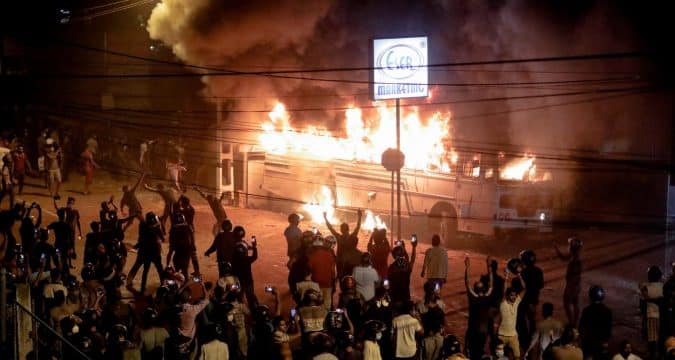
COLOMBO (UCAN): Sri Lanka’s president, Gotabaya Rajapaksa, declared a state of emergency on April 1 giving sweeping powers to security forces a day after hundreds tried to storm his house in anger over an unprecedented economic crisis.
Thousands of people gathered near Rajapaksa’s private residence on March 31 to protest rising prices and demand his resignation. Police fired tear gas and imposed a curfew for a few hours. Nearly 50 people were injured.
With the state of emergency, the military will be able to arrest and detain suspects for long periods without trial as demonstrations calling for his ouster spread across the nation.
The emergency was declared for “protection of public order and the maintenance of supplies and services essential to the life of the community,” Rajapaksa said in a proclamation.
Earlier, the country’s Catholic bishops called for unity among politicians to save Sri Lanka from becoming a failed state.
The rulers are under obligation to serve all the citizens by putting the country first and not act out of political expediency but principle
Bishop Fernando
Bishop Winston Fernando, president of the Sri Lankan Bishops’ Conference, said successive governments were responsible to varying degrees for the present state of affairs.
“The country is fast approaching the precipice of a failed state that will, in its wake, inflict irreversible injuries on the people,” the bishop said in a statement on behalf of the bishops’ conference.
The country of 22 million people is facing its worst economic crisis since independence from Britain in 1948.
Foreign reserves hit a record low, and the dollar shortage has caused power outages affecting all sectors, while skyrocketing prices of essential goods have disrupted life across the country.
Bishops urged all Catholic institutions, parishes and private institutions as well as men and women of goodwill to organise assistance to help those severely affected by the economic crisis.
“The rulers are under obligation to serve all the citizens by putting the country first and not act out of political expediency but principle,” Bishop Fernando said.
“What the country needs is an immediate solution to remedy the critical situation and to work on short-term and long-term solutions to put the country on a solid foundation of sustainable development,” he swiad.
The country today is in a hopeless situation and it is the result of a series of wrong choices made not only by politicians but also by citizens who have allowed themselves to be exploited by the political and cultural forces that handed down our destiny
Cardinal Ranjith
Sri Lanka needs nearly US$7 billion [$54.84 billion] to service its external debt this year.
The crisis has caused massive public anger, with people unable to find medicines, fuel and basic items of food such as milk powder because the country has run out of foreign currency to pay for imported goods.
With no air conditioners or fans, people are sweltering amid 10- to 12-hour power cuts. The government does not have the money to pay for the fuel needed by power plants.
People with serious medical conditions are struggling to find medicine, and hospitals have cancelled operations, as they have no diesel to operate generators during blackouts.
The government has switched off street lighting to save electricity. Mobile phones have been affected because the standby generators used at the cellular base stations have run out of diesel.
Activist, Nuwani De Silva, said people must stand in line from morning until evening to buy essential items.
“How do we manage our daily work with a 12-hour power cut? People are in an aggressive mood everywhere in the country,” De Silva said. “Wherever government ministers are seen on streets, the public protests against them,” she added.
Malcolm Cardinal Ranjith of Colombo recently called for a national transformation to tackle the crisis.
“The country today is in a hopeless situation and it is the result of a series of wrong choices made not only by politicians but also by citizens who have allowed themselves to be exploited by the political and cultural forces that handed down our destiny,” Cardinal Ranjith said at Colombo’s Anglican cathedral on March 27.








